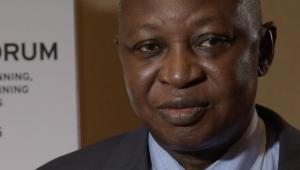Dr Caleb Fundanga, who took over as director in July, said that although the organisation was established to help countries manage their debt problems, its role quickly developed to include macroeconomic analysis and financial management.
Speaking to Public Finance International at Mefmi’s combined forum in Washington DC on October 6, he said: ‘Unless economies are properly managed, the debt problem will continue recurring.’
‘We’ve seen that since countries started managing their economies properly, growth has returned to Africa… Much of the growth that we’ve seen in our countries has been because there has been an improvement in the way we manage our economies.’
Mefmi, which celebrates its 20th anniversary this year, had played its part in these improvements, organising courses in macroeconomic management, monetary policy, reserves management and bank supervision, added Fundanga.
Central banks in Mefmi member countries were now able to spot emerging problems in the banking sector and take the necessary actions.
Over the years, Mefmi has also shifted to providing tailored solutions to countries that request the organisation’s help with capacity building, Fundanga said. These requests might come from finance ministries, central banks, ministries of planning or statistical bureaus, he explained.
Mefmi was also becoming increasingly self-sufficient, with member countries now providing 70% of the funds to keep the organisation running, up from just 40% when it was founded 20 years ago, Fundanga told PF International.
‘All of us at Mefmi are confident that today it is possible for all of us to stand on the resources of its African stakeholders and we are trying to expand that stakeholder group to include the private sector.’
Prior to joining Mefmi, Fundanga served as governor of Zambia’s central bank. He has also held senior positions at the African Development Bank, the International Monetary Fund and the Zambia Revenue Authority.
Watch Dr Fundanga's reflections on Mefmi's past and future challenges.













